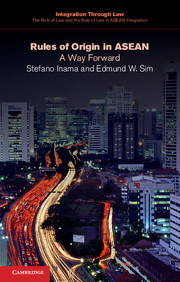Book contents
- Frontmatter
- Contents
- List of Tables
- General Editors’ preface
- Preface
- List of Abbreviations
- Chapter 1 Introduction
- Chapter 2 The initial set of ASEAN rules of origin: the lack of clarity and transparency masquerading as simplicity 1992–1995
- Chapter 3 Externalizing the confusion: the proliferation of rules in the ASEAN FTAs with dialogue partners
- Chapter 4 The silent cost: the cumbersome administration of ASEAN rules of origin
- Chapter 5 The possible way forward: self-certification
- Chapter 6 Conclusion and recommendations
- Executive Summary
- Appendices
- Bibliography
- Index
Executive Summary
Published online by Cambridge University Press: 05 March 2015
- Frontmatter
- Contents
- List of Tables
- General Editors’ preface
- Preface
- List of Abbreviations
- Chapter 1 Introduction
- Chapter 2 The initial set of ASEAN rules of origin: the lack of clarity and transparency masquerading as simplicity 1992–1995
- Chapter 3 Externalizing the confusion: the proliferation of rules in the ASEAN FTAs with dialogue partners
- Chapter 4 The silent cost: the cumbersome administration of ASEAN rules of origin
- Chapter 5 The possible way forward: self-certification
- Chapter 6 Conclusion and recommendations
- Executive Summary
- Appendices
- Bibliography
- Index
Summary
The rules of origin (RoO) constitute a fundamental foundation for any preferential trade agreement (PTA). RoOs are similar to nationality and citizenship rules for natural persons in a nation-state. Qualifying persons may enjoy the benefits of citizenship, such as freedom of movement, permanent residency and the like. Similarly, RoOs determine the applicable duty rate and other treatment for goods in the PTA.
Taken in this context, the ASEAN RoOs, originating in the ASEAN Preferential Trade Agreement (APTA), developed in the ASEAN Free Trade Area (AFTA) agreement and purportedly refined in the ASEAN Trade in Goods Agreement (ATIGA), have created a relatively muddled and confused trading situation. The ASEAN RoOs are both ill-defined and ill-administered, resulting in less-than-optimal usage of the ASEAN trade preferences and stunting the growth of the ASEAN Economic Community (AEC). These deficiencies have been carried forward into ASEAN’s free trade agreements (FTAs) with its main dialogue partners of Australia–New Zealand, China, India, Japan and Korea.
The poor definition of ASEAN RoOs dates back to the APTA and AFTA. The concept of regional value added as a qualifying RoO was not properly spelled out, with ASEAN customs authorities and practitioners having to fill out the details through trial and error, often to the detriment of the business sector.
- Type
- Chapter
- Information
- Rules of Origin in ASEANA Way Forward, pp. 93 - 95Publisher: Cambridge University PressPrint publication year: 2015



